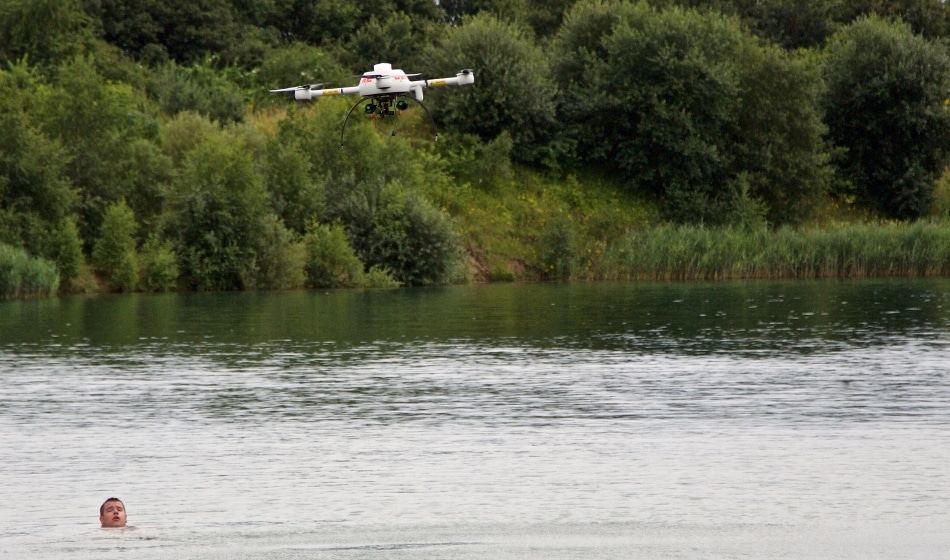Aug 2 2016
 A microdrones md4-1000 UAS drops a compact rescue device called RESTUBE; the swimmer in this demonstration was able to grab onto the RESTUBE and float until they could be brought back to safety. (microdrones)
A microdrones md4-1000 UAS drops a compact rescue device called RESTUBE; the swimmer in this demonstration was able to grab onto the RESTUBE and float until they could be brought back to safety. (microdrones)
microdrones™ collaborated with the DLRG Horneburg/Altes Land e.V. (German Lifeguard Association) on 22 July, 2016, to simulate the task of rescuing a drowning swimmer in order to illustrate the life-saving potential of an approach that integrates two cutting-edge technologies, which include RESTUBE and unmanned aerial systems (UAVs).
Huge crowds gathered at the banks of the Elbe River to witness the UAV flying rapidly to a distressed swimmer and dropping RESTUBE, a compressed rescue device, which inflates automatically. The distressed swimmer took hold of the RESTUBE and stayed afloat until a human lifeguard was able to reach them and bring them back to safety.
An adult drowns in approximately 60 seconds and a child in only 30. All too often, this is not enough time for the victim to be reached by a lifeguard. Flying over the water is a much quicker way to reach the victim. By combining UAVs and RESTUBE flotation devices, we are able to buy the drowning person valuable time that could very well mean the difference between life and death.
Christopher Fuhrhop, Founder and CEO, RESTUBE
The microdrones md4-1000 was the UAV used in the rescue mission. This quadcopter drone has been built with carbon fiber housing, specifically developed motors, increasingly efficient batteries, and a built-in GPS system that enables the UAV to fly and remain in position during the occurrence of strong winds over the water.
The microdrone also comprises of an imaging camera that has the ability to stream live to the specially trained lifeguard operating the drone, allowing them to easily identify a precise location to drop the RESTUBE flotation device.
The gold German Founders Award, considered to be an extremely significant prize for entrepreneurs in Germany, was won by RESTUBE in July, 2015. Since then, RESTUBE has consistently shown immense potential in an increasing number of rescue applications. The results of this rescue simulation was celebrated by RESTUBE and microdrones team members, DLRG Horneburg/Altes Land e.V. lifeguards and leadership, police personnel, and a number of locals.
One of the greatest obstacles to rescuing a drowning swimmer is that they panic and we often can't reach them in time. After seeing what I saw here today, I have no doubt that drones will play a significant role in the near future of water rescue – and that we'll see less fatalities as a result.
Robert Rink, DLRG Horneburg/Altes Land e.V
Rink highlighted other ways for using microdrones quadcopters in order to resolve issues faced in lifeguard rescue situations. Some of these other applications include:
- Delivering significant medicines and supplies for container ships and tankers that are located nearby
- Improving the distribution of rescue personnel because of live imaging
- Gathering data on the condition of leaking and burst banks on hard-to-reach embankments
- Locating people in a much easier and rapid manner by using thermal imaging cameras fixed to UAVs
We were very pleased today to be able to show off the potential of this approach to rescue. Days like these are what motivate the team at microdrones to strive for new solutions. Days when our technology comes together with others' in ways that change the world for the better. We're very proud to work with innovative organizations like RESTUBE, DLRG Horneburg/Altes Land e.V., and many others on UAV solutions that save lives.
Sven Juerss, CEO, Microdrones